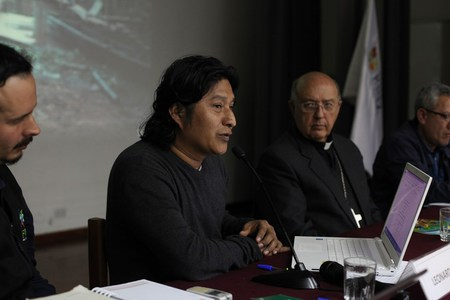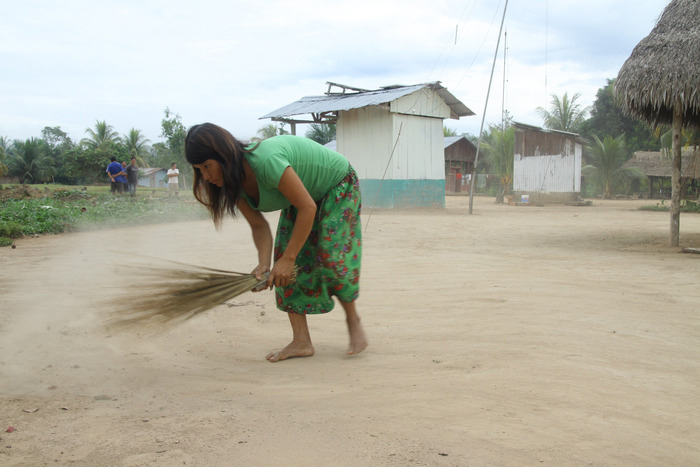
2. Rediscover the value of simplicity in your own life
But seek first his kingdom and his righteousness, and all these things will be given to you as well. (Mt. 6, 33)
We must reflect on our priorities and consider whether we live above our needs, if we consume more than we should. This lifestyle has triggered a global crisis and highlights the economic and environmental unsustainability of our consumption model.
The incessant search for profit disrupts the possibilities of reaching equitable models, because accumulating capital, material and wealth impoverishes the arrival of the Kingdom of God and its Justice. It is time to make all things new, to generate spaces for hope, from every person, gesture and action, because every act counts, no matter how insignificant or small.
"Christian spirituality proposes a growth marked by moderation and the capacity to be happy with little. It is a return to that simplicity which allows us to stop and appreciate the small things, to be grateful for the opportunities which life affords us, to be spiritually detached from what we possess, and not to succumb to sadness for what we lack. This implies avoiding the dynamic of dominion and the mere accumulation of pleasures." (LS, 222).

Pope Francis' encyclical Laudato Si' (LS) points the way for us to rediscover the value of simplicity and reflect on our lifestyles. The search for sustainability is an opportunity to return to the sources. We need to build on another model of development in order to access "any new development that the future may bring" (Benedicto XVI, Cart. enc. Cartias in veritate, 21).
Once again, we are at this time invited to prepare ourselves to live Christmas modestly. We are called to find happiness in the small, to feel close to those millions of people who live unjustly in poverty, to mobilise and involve ourselves to change their realities and to share. We have the opportunity to reflect on our daily choices, personal and collective, in relation to consumption, sustainability and the use of resources. A time to relearn and rediscover the greatness of living life with simplicity and modesty. Moreover, as the Gospel reminds us, there is greater happiness in giving than in receiving (Acts 20:35).
Voices that claim
The value of simplicity in your own life

Leonardo Tello
Nauta, Peruvian Amazon
"Young Garza gets ready for a new catch."
Leonardo Tello is a kukama, he lives in Nauta, a village near Iquitos, in the Peruvian Amazon. For him and his people, water is the place of life, because the kukama are the people of the river. The inhabitants of the river are the ancestors, the wise...
His wife and son waited for him in the community to come back with fish for lunch. The young man stood on the bank of the river, his feet in the water, watching the fish passing by. After a while, he shook his body, turned into a huge white heron, and started fishing (Kukama Story The Young Heron").
"As a kid, my parents told me countless times the story of the young heron, the one capable of doing the best fishing. The story could be heard almost anywhere. At home, on the farm or sailing down the river in a canoe. My friends and I used to pretend to be "the young heron". Sometimes, I was able to take the lead in fishing, actually, it rarely happened since my friends were better at it and my brother Rti was a very good angler.
Training a son to be a good angler requires a hard physical, mental and spiritual discipline. Usually, the preparation was in the hands of the kukama shamans, but the parents who had received training could do so too. It took time, but it had to be done because much of life was dedicated to the river, to fishing, navigating the great rivers of the Amazon. Far from the river, life is no more for the Kukama. In the river live our ancestors, our loved ones.
Recently, everything has changed rapidly and violently for the lives of river dwellers.

Pedro Casaldáliga
Brazilian bishop
"So long as the First World stops to be so will it be able to aid the Third World".
Pedro Casaldáliga Plá, is a Spanish priest, writer and poet who has spent a great part of his life in Brazil defending the Rights of those deprived of them. He arrived in the State of Mato Grosso in 1968 as a Claretian Missionary and he has remained there ever since, at the service of the poorest, always linked to the theology of liberation. His work can be consulted on his website:
www.servicioskoinonia.org/Casaldaliga
He's been sick with Parkinson's for some time now and, in order to stay side by side with the poorest and most excluded, he refused to leave his house.
Evangelical Poverty as conceived by Casaldáliga in his verses provides for a great opportunity during this time of Advent and Christmas. Let us take advantage of it.
EVANGELICAL POVERTY
Having nothing.
Do not take anything.
Unable to do anything.
Do not ask for anything.
And, in passing,
do not kill anything;
do not silence anything.
Only the Gospel, like a sharp knife.
And tears and laughter in the eyes.
And the extended hand clasped.
And life, riding horseback.
And this sun and these rivers and this
purchased land,
as witnesses to the Revolution ready
erupted.
And "mais nada"!
The value of simplicity in your own life

I want to remember those stories once again.
Stories like those of the "young heron" to tell my brothers and sisters, my sons and daughters, the children, the youngest, that we all are that young heron, once a good fisherman with a river full of fish that today falters polluted. We are going to regain ownership over of our rivers, we are going to defend them from those who destroy them and want to destroy us.
For Leonardo, attacking the water and the river does not only mean killing the fish or dying of thirst, but rather it means, above all, dying of sorrow, because the spirits go away and so does the whole history of a community. Nowadays, actions such as pollution, hydroelectric and mining megaprojects or the extractive model pollute the waters and they are destroying the Kukama and other the villages one at a time.
I open the tap at home and let it run a bit before drinking a glass of water and I sip its history, I taste it and, in this simple and daily act, I can see an entire community through Leonardo's eyes and his committed and brave fight for the waters of the Amazon.


What can you do
(or stop doing)?
REGAIN A TASTE FOR SIMPLE THINGS, EVEN AT CHRISTMAS.
Advent and Christmas are special times in which, as Christians, we are paving the way for the Lord. Here is our proposal to rediscover the value of simplicity in the celebration of these festivities throughout all Sundays of Advent:

First phase
First Sunday of Advent: Let us be awake, the Good News is announced (the Saviour is coming) and some good news: We can do something to change our way of life towards one that is more sustainable and concerned for others. Consumerism is a choice, not an obligation. What will we choose?
Second Sunday in Advent: We must set out towards a more austere way of life. Because austerity does not mean cuts, it means being free from the chains of consumerism. Austerity is a way of life, a journey and, like utopia; we must be on our way at some point, why not do it now?
Throughout these two weeks, let us develop a way of celebrating our holidays while making austerity our principle:
- Let us think of simple meals in our celebrations.
- Let us be attentive to the quantities so as not to waste.

Second phase
Third Sunday of Advent: See what happens when we commit ourselves to change. Things cease to be so important, and people gain relevance.
Fourth Sunday of Advent: To announce, to make known to others the meaning of our modest celebration. Jesus was born in a manger, without luxuries, surrounded by simple people.
Thourghout these two weeks, let us worry about the people around us. Let us prepare the celebration by thinking about sharing with loved ones. And with those who are far away, let us get in touch.
- Let us prepare the celebrations with people in mind. Let us create an environment in which to be at ease with others and enjoy sharing our time with others.
- Let us think about each and every single one of the people we are going to give to. In their tastes so to create personalized gifts which do not necessarily have to be expensive. Valuable for the human quality they contain because of the time it has taken us to make or search for them and not for their price.
- Those who are far away, let us write to them. But in handwriting, really conveying a part of us. It is a good time to contribute with the greeting cards that many NGOs have.
Prayer

Lord, I am feeling that you are calling me with different voices, to stop my haste, to recover the slow breath of life, the simplicity of a life lived. I hardly recognize my disorientation, so busy in my own things and in those of others! In spite of my unconsciousness, I feel Your Presence in me, which invites me to be myself and not to let myself be manipulated by the propaganda and noises of the media that surround me, which try to dictate to me and impose on me a superficial and materialistic life, full of "unnecessary" needs. Yes, Lord; I admit that, indeed, I would need very little to live a healthy and peaceful life with myself and with others, which would surely make me happier.
My resilience and obstacles are great, but I know that "You hear my cries and do not abandon me". Lord, give me the capacity to recover the likeness of your Son Jesus Christ, his simplicity and humility so that, by following his Word, I can live and act sustained not by my capacity but by the Wisdom that resides in You. May your Mother, the Immaculate Virgin Mary, a human example of humility and simplicity, help me to rediscover the value of the simple life I want to recover. Amen
